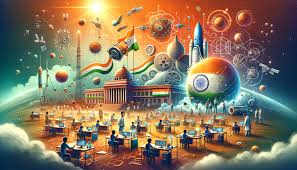While IITs have failed to respond to national technological priorities, they have found the time, money, and institutional will to expand into Humanities and Social Sciences (HSS), not as complementary disciplines but as full-fledged ideological projects.
Despite being one of the world’s leading engineering institutions and home to thousands of technical colleges, India faces a growing national concern: the reliance on foreign companies and firms for essential technical services. A good example that has emerged recently is the reliance on Turkey’s Celebi Aviation and Turkiye Mechanic, which manages airport ground handling, maintenance, and aircraft servicing in all major Indian airports. For a country that sends satellites into orbit, reaches Mars in one go, develops the most sophisticated missile system and nuclear program with no outside help, runs one of the world’s most sophisticated technologically advanced weapon systems, does medicinal wonders, and moves ahead, aspires to become a global manufacturing hub, such dependency is neither technical nor logistical, but rather reflective of the wrong priorities that are both intellectual and institution-driven. In other words, the failure lies not in our capabilities but in our priorities. And that failure is most sharply visible in the yawning disconnect between our IITs (Indian Institutes of Technology), IIMs and other HEIs (higher education institutes) and the real engineering demands of a rising Bharat.
These institutions were set up with a clear vision: to produce high-quality engineers who would drive nation-building. Over the decades, that vision has been compromised as these institutions, instead of aligning with emerging national sectors like aerospace maintenance, defence production, logistics, and large-scale systems engineering, have drifted toward theoretical research, doing legwork, and seeking validity from Western academics. For example, courses in MRO (Maintenance, Repair, Overhaul), aviation logistics, or ground infrastructure remain virtually non-existent. India’s civil aviation sector has expanded dramatically in the last 15 years. Yet, there are no full-fledged training pipelines from our top-tier institutes to service that industry. The irony is striking. While we train thousands of engineers every year, we cannot find skilled manpower to maintain or manage our own aircraft.
This is not just another missed economic opportunity but a strategic and security-level concern. No developed country outsources such sensitive technical infrastructure. Yet, we have done precisely that. This is an indictment not just of engineering colleges but an entire STEM (science, technology, engineering, mathematics) higher education ecosystem that has become allergic to applied learning, national alignment, and industrial responsiveness. This disconnect becomes all the more dangerous when viewed in light of India’s ambitions for Amrit Kaal. Viksit Bharat goes beyond the GDP numbers or global rankings. The vision concerns genuine self-reliance, building systems, value supply chains, and institutions that no longer look outward for solutions to domestic technological and infrastructure needs. A key pillar of that vision must be a re-imagined STEM education sector, which doesn’t just chase publication counts or Silicon Valley dreams but becomes foundational to civilizational rebuilding.
Unfortunately, while IITs have failed to respond to national technological priorities, they have found the time, money, and institutional will to expand into Humanities and Social Sciences (HSS), not as complementary disciplines but as full-fledged ideological projects. What should have been a support structure to encourage ethical and interdisciplinary thinking in engineering has become a Trojan horse for ideological capture. Several IITs today house HSS departments indistinguishable from the worst elements of grievance-driven social science faculties elsewhere.
These departments act as echo chambers for imported theories on gender, caste, climate guilt, postcolonial resentment, and anti-national activism. The IIT brand lends these theories unwarranted legitimacy. Many students entering to become engineers exit with a toolkit of intellectual self-loathing and suspicion towards the very nation that subsidized their education.
This is not interdisciplinarity. This is ideological colonization, funded by public money and justified in the name of academic freedom. Public universities may still offer some diversity of thought within the humanities, but in the IITs, the HSS departments have become bastions of a Woke-Jihadi academic complex that remained detached from India’s civilizational ethos and hostile to the idea of Bharat as a coherent cultural entity. Indeed, the NEP 2020 envisioned interdisciplinary learning but not as a license for ideological mischief. Science institutions must exercise great caution in opening themselves to areas where training, intent, and philosophical grounding are essential. Without guardrails, this trend will only worsen and risk hollowing the institutions from within.
It’s also important to ask: why must a scientific engineering institution like an IIT replicate what JNU, DU, or BHU already do, and in many cases, do with a far more diverse academic spectrum? If the IITs continue to dabble in areas they neither understand nor culturally align with, they will lose sight of their own mission. The way things are working today in these institutions is not only serving as a distraction but also as an institutional crisis in the making. The resources, energy, and prestige of these institutions must be directed toward solving real-world Indian problems, not amplifying theoretical grievances imported from Marxist ideologues.
The solution is not to wall off disciplines entirely or return to narrow technical instruction. Rather, it is to reassert the original mission of scientific and technical education: to serve the national interest. If NEP’s vision of holistic learning is to succeed, then IITs and other technical HEIs must first get their house in order. That means prioritizing mission-critical sectors like aerospace servicing, defence production, advanced manufacturing, cyber-physical systems, disaster logistics, and public infrastructure design.
Strong incentives must exist to create dedicated tracks and vocational-academic bridges in areas such as aircraft maintenance, airport systems engineering, and secure logistics. This is not mere technocracy. It is the backbone of sovereignty. If we do not produce engineers who can fix a fighter jet, run a radar system, or manage critical airport tech, we will remain economically and strategically vulnerable. The Turkish example must be a wake-up call. Why should firms like Celebi Aviation be here at all? With a population of 1.4 billion and the best engineering talent pool in the world, India must not just ask this question but build institutions that ensure it never has to again.
National security is an important aspect of Viksit Bharat 2047, and we are facing terrorism in all forms, now corporate terrorism. We talk so much on skilling and connecting to industry, and AI 171 mysterious crash and our worst air disaster exposes that our engineering colleges have grossly failed to deliver. There is a huge gap between industry needs and what the best engineering colleges are doing to the national vision and mission of a Atmanirabar Bharat.
We are in a crucial decade. India’s rise is not guaranteed. It depends on whether we can transform how we educate our brightest minds. Either we course-correct or watch institutions of immense national importance become intellectually captured, technically irrelevant, and economically parasitic. NEP has given us a broad canvas. But now, each institution must decide whether it will paint a future that serves Bharat or descend into abstract, adversarial, and ultimately anti-national scholarship. The choice is not between science and humanities. It is between national service and national subversion. For Viksit Bharat to become a reality, our institutions, particularly STEM engineering, must align their vision with India’s needs, not Western universities or imported ideologies. Because the next war may not be won by missiles alone but by engineers who can keep them operational and secure at home for a sovereign and self-reliant Bharat.
* Prof. Santishree Dhulipudi Pandit is the Vice Chancellor of JNU.







